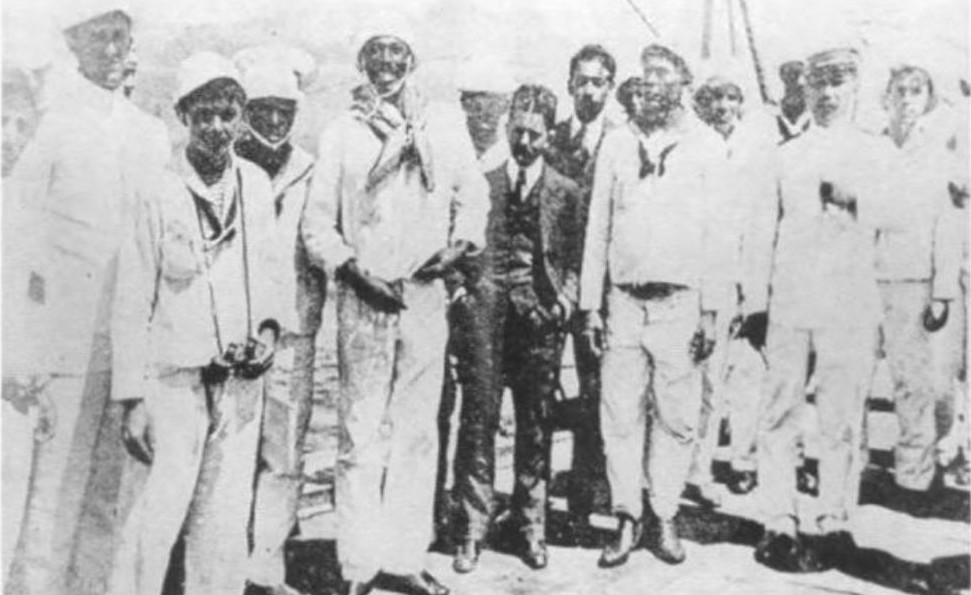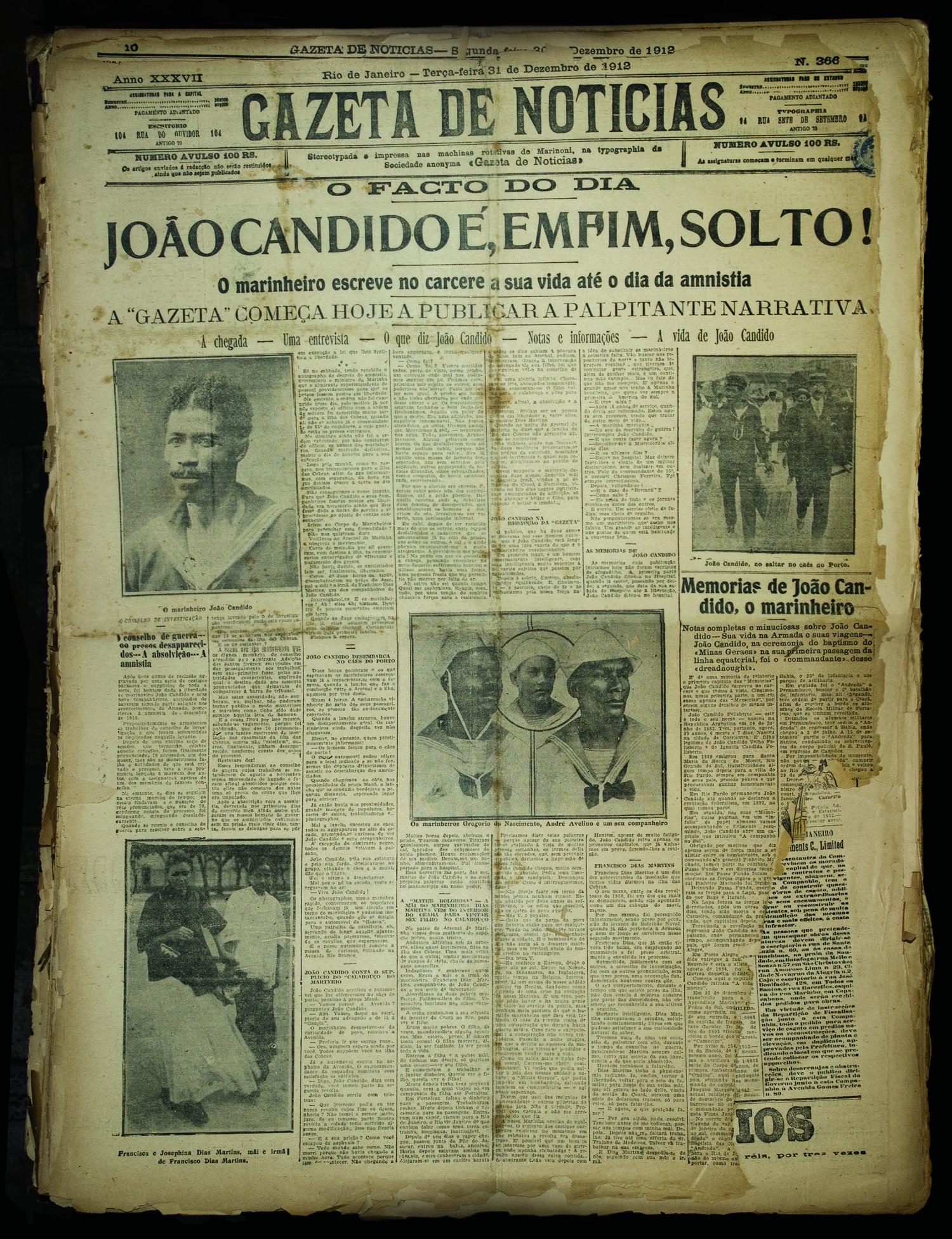João Cândido Felisberto on:
[Wikipedia]
[Google]
[Amazon]
João Cândido Felisberto (24 June 1880 – 6 December 1969) was a Brazilian sailor, best known as the leader of the 1910 "
 The conditions for Brazilian sailors at the time were harsh, and being black, Felisberto suffered prejudice from the white officers in the Brazilian Navy. Several Brazilian sailors had been sent to Newcastle-Upon-Tyne in England during the two year period taken for the construction of the
The conditions for Brazilian sailors at the time were harsh, and being black, Felisberto suffered prejudice from the white officers in the Brazilian Navy. Several Brazilian sailors had been sent to Newcastle-Upon-Tyne in England during the two year period taken for the construction of the  In November 1910, the flogging of a sailor, against Navy regulations (250 strokes instead of the allowed 25 strokes), was a contributing factor to the revolt, known in Brazil as "Revolta da Chibata" ("
In November 1910, the flogging of a sailor, against Navy regulations (250 strokes instead of the allowed 25 strokes), was a contributing factor to the revolt, known in Brazil as "Revolta da Chibata" ("
Afro-Latin America, 1800-2000
/ref> A statue of João Cândido Felisberto was erected in Rio de Janeiro. His life was portrayed in a movie, '' Memórias da Chibata''
''Chibata Memories''
, in 2006, retelling his fight against the Lash with actors, and a documentary called ''Cem Anos Sem Chibata''
''Cem Anos Sem Chibata''
, a coproduction with EBC, in 2010. Both productions were written and directed b
Marcos Manhães Marins
Revolt of the Lash
The Revolt of the Lash ( pt, Revolta da Chibata, link=no) was a naval mutiny in Rio de Janeiro, Brazil, in late November 1910. It was the direct result of the use of whips ("lashes") by white naval officers when punishing Afro-Brazilian and mixe ...
". His name was sometimes given as simply "João Cândido" or "Jean Candido" in foreign articles.
Early life
João Cândido Felisberto was born in Encruzilhada do Sul, Rio Grande do Sul, to a poorAfro-Brazilian
Afro-Brazilians ( pt, afro-brasileiros; ) are Brazilians who have predominantly African ancestry (see " preto"). Most members of another group of people, multiracial Brazilians or ''pardos'', may also have a range of degree of African ancestry. ...
family in 1880. His father and mother were former slaves. He entered the Brazilian Navy
)
, colors= Blue and white
, colors_label= Colors
, march= "Cisne Branco" ( en, "White Swan") (same name as training ship ''Cisne Branco''
, mascot=
, equipment= 1 multipurpose aircraft carrier7 submarines6 frigates2 corvettes4 amphibious war ...
in 1894 at the age of 13.
 The conditions for Brazilian sailors at the time were harsh, and being black, Felisberto suffered prejudice from the white officers in the Brazilian Navy. Several Brazilian sailors had been sent to Newcastle-Upon-Tyne in England during the two year period taken for the construction of the
The conditions for Brazilian sailors at the time were harsh, and being black, Felisberto suffered prejudice from the white officers in the Brazilian Navy. Several Brazilian sailors had been sent to Newcastle-Upon-Tyne in England during the two year period taken for the construction of the dreadnought
The dreadnought (alternatively spelled dreadnaught) was the predominant type of battleship in the early 20th century. The first of the kind, the Royal Navy's , had such an impact when launched in 1906 that similar battleships built after her ...
. João Cândido arrived there in September 1909 and left in January 1910 as part of the crew of the newly commissioned ''Minas Geraes''. It was while experiencing the living conditions and increased freedoms of Newcastle that João Cândido realised how unacceptable conditions in the Brazilian Navy were.
The sailors had many secret meetings in Rio de Janeiro, planning a strategy to stop the corporal punishment still imposed in the new Navy, which had received two new modern battleships in 1910. In November 1910, the flogging of a sailor, against Navy regulations (250 strokes instead of the allowed 25 strokes), was a contributing factor to the revolt, known in Brazil as "Revolta da Chibata" ("
In November 1910, the flogging of a sailor, against Navy regulations (250 strokes instead of the allowed 25 strokes), was a contributing factor to the revolt, known in Brazil as "Revolta da Chibata" ("Revolt of the Lash
The Revolt of the Lash ( pt, Revolta da Chibata, link=no) was a naval mutiny in Rio de Janeiro, Brazil, in late November 1910. It was the direct result of the use of whips ("lashes") by white naval officers when punishing Afro-Brazilian and mixe ...
"). Sailors took control of two Brazilian battleships, ''Minas Geraes'' and ''São Paulo'', both built in England
England is a country that is part of the United Kingdom. It shares land borders with Wales to its west and Scotland to its north. The Irish Sea lies northwest and the Celtic Sea to the southwest. It is separated from continental Europe b ...
, as well as two other major warships. Their demands included the abolition of torture as a form of punishment and improved living conditions in the Brazilian Navy. João Cândido was the leader of the movement. The new Brazilian president, Hermes da Fonseca
Hermes Rodrigues da Fonseca (; 12 May 1855 – 9 September 1923) was a Brazilian field marshal and politician who served as the eighth President of Brazil between 1910 and 1914. He was a nephew of marshal Deodoro da Fonseca, the first president ...
, promised the end of "Chibata" and approved an amnesty, but the government later went back on this promise. In the revolt's aftermath Felisberto and many of his fellow mutineers were either arrested, tortured or murdered in prison. Felisberto himself was tortured, and also contracted tuberculosis
Tuberculosis (TB) is an infectious disease usually caused by '' Mycobacterium tuberculosis'' (MTB) bacteria. Tuberculosis generally affects the lungs, but it can also affect other parts of the body. Most infections show no symptoms, i ...
, but he recovered after some months and was eventually released. The Brazilian press nicknamed him "Almirante Negro", or the "Black Admiral", for his actions.
Later life
After his release, he sank into poverty and experienced discrimination, working in a harbor on a very low salary. He was arrested again in 1930 but was soon released. In 1933 he joined theintegralist
In politics, integralism, integrationism or integrism (french: intégrisme) is an interpretation of Catholic social teaching that argues for an authoritarian and anti- pluralist Catholic state, wherever the preponderance of Catholics withi ...
movement. In 1938 an integralist uprising
The Integralist Uprising () was a failed coup by the Brazilian Integralist Action (AIB) against the government of President Getúlio Vargas during the Estado Novo in Brazil. The AIB was created due to the radicalization of politics following th ...
was easily crushed by the Brazilian military, with fewer than twenty deaths, and the group was outlawed.
With Brazil at war with the fascist Axis powers
The Axis powers, ; it, Potenze dell'Asse ; ja, 枢軸国 ''Sūjikukoku'', group=nb originally called the Rome–Berlin Axis, was a military coalition that initiated World War II and fought against the Allies. Its principal members were ...
from 1942 onwards, integralism became a small and powerless movement. Germany's defeat in 1945 reduced integralism to very little importance. João Cândido Felisberto said in 1968 that he was proud to be an integralist. After living in ostracism in the Brazilian city of São João de Meriti
São João de Meriti (, ) is a Brazilian municipality in the state of Rio de Janeiro. Its historical name is São João do Rio Meriti. Its population was 472,906 inhabitants in 2020. It's located in the region of Baixada Fluminense, having 34.996 ...
and being persecuted by the Brazilian Navy, he died of cancer
Cancer is a group of diseases involving abnormal cell growth with the potential to invade or spread to other parts of the body. These contrast with benign tumors, which do not spread. Possible signs and symptoms include a lump, abnormal b ...
in 1969 in Rio de Janeiro
Rio de Janeiro ( , , ; literally 'River of January'), or simply Rio, is the capital of the state of the same name, Brazil's third-most populous state, and the second-most populous city in Brazil, after São Paulo. Listed by the GaWC as a ...
, at the age of 89.
Legacy and statue
The Lash Uprising, which was sparked by the Brazilian Navy's use of torture, ended with Felisberto and many of his followers imprisoned and tortured. The revolt was cited later by labor organizers as an "heroic example of worker struggle".Andrews, George ReidAfro-Latin America, 1800-2000
/ref> A statue of João Cândido Felisberto was erected in Rio de Janeiro. His life was portrayed in a movie, '' Memórias da Chibata''
''Chibata Memories''
, in 2006, retelling his fight against the Lash with actors, and a documentary called ''Cem Anos Sem Chibata''
''Cem Anos Sem Chibata''
, a coproduction with EBC, in 2010. Both productions were written and directed b
Marcos Manhães Marins
References
Notes
Online
*https://web.archive.org/web/20080620021259/http://www.terrabrasileira.net/folclore/origens/africana/chibata.html (in Portuguese) {{DEFAULTSORT:Candido Felisberto, Joao People from Rio Grande do Sul Deaths from cancer in Rio de Janeiro (state) 1880 births 1969 deaths Brazilian rebels Brazilian mutineers 20th-century Brazilian military personnel